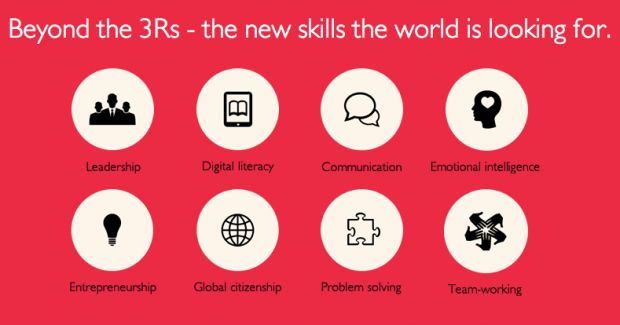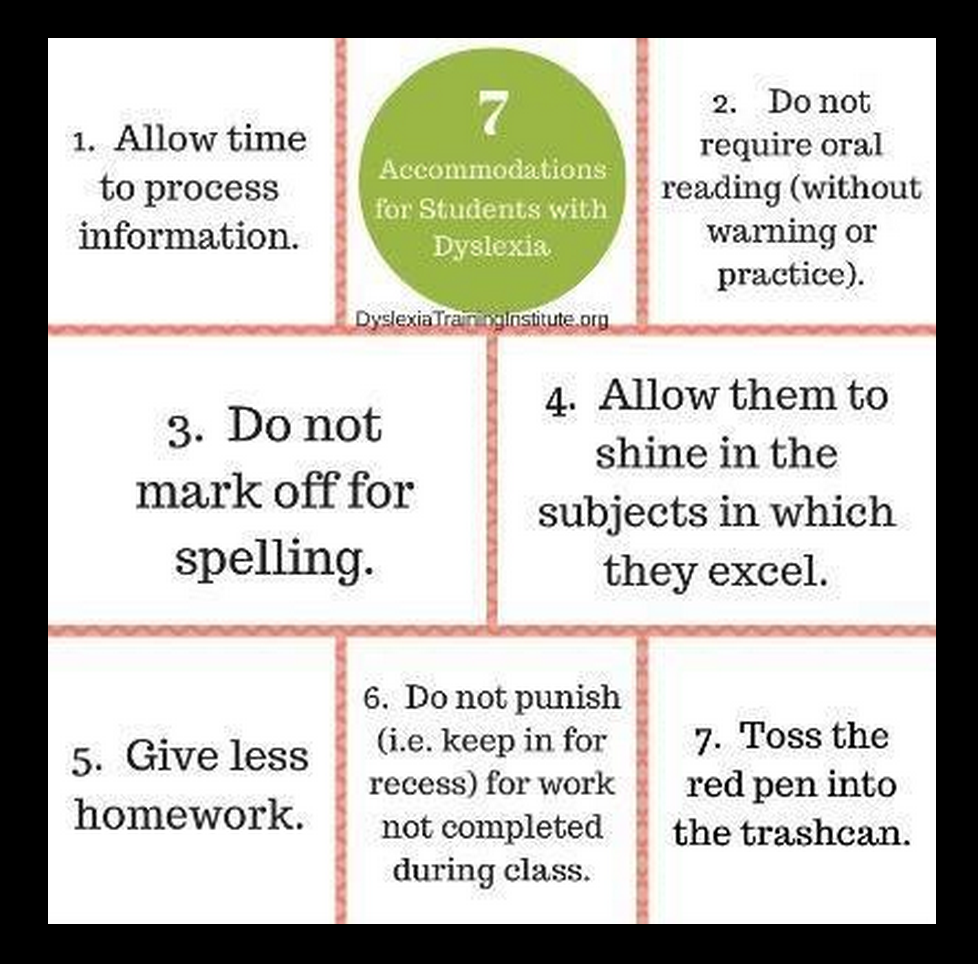Although this article is about children with Dyslexia, it has good information for parents of children with many different types of learning challenges.
Since discovering that my children have dyslexia, I have been absorbing all of the information about dyslexia that I can possibly find. In the process, I’ve learned so much.
I’d like to help others understand the 1 in 5 kids who have dyslexia as well.
So, without further ado, here are the top 10 things a parent to a child with dyslexia wishes you understood:
10. Grammar police, please stop.
Example: “Your dog is LAYING next to you?? What’s he laying? An egg?”
Why this is an issue: Dyslexia is a learning difference in processing language. It is much harder for someone with dyslexia to read, write and spell. Your gift may be in grammar, but someone with dyslexia may be gifted in science or music or inventing new products. Think before you judge, and think before you type that judgment into someone’s comment section. Would you like us to follow you around pointing out your un-athletic abilities or your deficiency in art? Didn’t think so.
9. Not all reading programs are equal.
Example: “I used XYZ early reading program/book/movie/device with my child, and he was reading full sentences by age 3. You should try that!”
Why this is an issue: Children with dyslexia learn in different ways. While these programs are just fine for non-dyslexics, a child with dyslexia needs a program built around multi-sensory explicit instruction in phonemic awareness. Orton-Gillingham, Wilson, and Barton are some of the methods with proven track records to help children with dyslexia. If you are not in the dyslexia community, it may not be helpful to give advice. We know it’s well meaning, but our children learn differently, and different reading programs match up with different kids.
 8. Reading more isn’t the cure.
8. Reading more isn’t the cure.
Example: “You should read to your kid at least 20 minutes a day. You know, I read to my kid since he was in the womb, and he caught right on!”
Why this is an issue: Okay, we are not discouraging reading to your child. We think it’s a great thing to do! Please, keep it up! Here’s the thing, though ….we DO actually read to our children as well! Every single day! We have read to them since birth. We have loads of books in our home. We have library cards, and we go weekly.
Reading to our children builds vocabulary, helps them learn about different cultures, and fosters imagination. It will not, however, magically teach them how to decode words. Please don’t assume that dyslexia is caused by a lack of early reading.
7. My child is NOT unmotivated/lazy/ignoring you/etc.
Example: “I kept him in from recess because he was lazy and not finishing his work.” or “He is not following directions, I told him to close his book, put up his backpack, and sit on the carpet. He just stayed by the backpack area.”
Why this is an issue: Dyslexia does not solely affect reading. While no two dyslexics are alike, many children with dyslexia struggle with processing speed. This includes processing both written and spoken language. Due to the slower processing speed, it will take them longer to do a worksheet. They may even yawn because so much effort is being put into decoding the words on the page. They are not being lazy. They are using so much brain-power that they are exhausted! Please, don’t hold them in from recess. They are spending their entire day working hard in a written world, and their brains need that break.
Also, multi-step directions may be a problem for many children with dyslexia. They are working hard to process the very first direction, and thus they may literally not hear the last step. They are not ignoring you. Repeat your directions, and most will say “oh!” and get busy doing whatever you said.
 6. There are GIFTS that come with dyslexia.
6. There are GIFTS that come with dyslexia.
Example: “Oh, that must be so hard to be dyslexic. What will he do in life?” This is usually followed by a very sad face.
Why this is an issue: Many people consider their dyslexia to be a gift! Yes, it makes processing language more difficult. However, other areas soar! A large number of people with dyslexia are inventors, scientists, athletes or actors. People with dyslexia tend to be very successful after graduation. As Dr. Sally Shaywitz from Yale often says, “dyslexia is an island of weakness surrounded by a sea of strengths!”
5. Accommodations are not cheating!
Example: “I can’t allow Johnny extra time on that test. It wouldn’t be fair to the rest of the class.”
Why this is an issue: Accommodations level the playing field for Johnny. They don’t give him an unfair advantage. Think of it like this, would providing a ramp up a set of stairs for a child in a wheelchair be “unfair?” What about a child who needs glasses? Is allowing him to use his glasses in class “unfair?” Just because you can’t see the difference in the brain does not mean it is not there.
4. Ear reading is real reading.
Example: “Oh, he’s listening to a book? That’s sweet. What has he actually read though?”
Why this is an issue: Ear reading is our word for audio books. This is important because reading, however you do it, helps to raise vocabulary, introduces you to different cultures, and gives you background knowledge you would not otherwise acquire.
For children with dyslexia, their IQ level is usually much higher than their actual reading level. As technology has advanced, we now have a way for our kids to read, independently, on their actual IQ level. My own son has seen such benefit from audio books via our Learning Ally membership! He listens daily. This allows him to not only build his vocabulary, but to also discuss books with his peers like Diary of a Wimpy Kid, Harry Potter, or Freckle Juice. It allows him a way to fit in, and to not feel so different.
Why would anyone want to discourage that?
We do still practice eye reading nightly as well. We work on it. It is equally important.
3. Help in school is not automatic.
Example: “Why are you upset? He gets all that help in school now.”
Why this is an issue: When you are the parent to a child with dyslexia, it’s an uphill battle. First, you need to secure a diagnosis. Most schools will evaluate a child for special education services, but not necessarily for dyslexia. A specific diagnosis is important because it helps parents and educators know which type of reading program to provide. If your child does qualify for special education services in school (not all dyslexics meet the qualifications), there is no guarantee that the program provided will be one that is research based specifically for dyslexia. That’s because most schools do not test for dyslexia. And we go round and round.
So, what do parents do? If we can afford it, we hire private dyslexia tutors, who are specialized beyond most reading tutors. See point number 9.
 2. Our kids can learn to read. They also do not see backwards.
2. Our kids can learn to read. They also do not see backwards.
Example: “Your child is dyslexic? That means he can’t read, right? It must be hard since he sees everything backwards.”
Why this is a problem: Our kids can, in fact, learn to read, and some will even read well! They just need to have access to a research based reading program made specifically for dyslexia. Also, kids with dyslexia do not “see” backwards. They see just like everyone else. Sometimes you will see them reverse letters, but that is because many have struggles with left vs right and orthographic processing. It has nothing to do with how they see.
1. My child is one of the smartest kids in the class.

Example: “Slow readers are clearly …well …slow.”
Why is this an issue: The reading circuit in the brain is totally separate from intelligence. If our school system was set up in a way where everyone learned via musicals, then the people who don’t sing well would be considered “slow.” Reading is just one area where some people excel, and some do not. It is not a sign of intelligence. Actually, the majority of people with dyslexia have average to above average IQ levels. All upper level thinking skills are there. Our kids can do grade level work (and sometimes above grade level work), but many will need to acquire the information in some format aside from written text. This is where audiobooks really benefit our children! They are just as smart as all of the other kids in class, and sometimes they are even the smartest child in class. Reading text is not the best way to measure intelligence.












 Dyslexia
Dyslexia